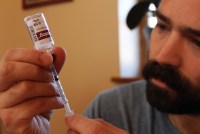Latest KFF Health News Stories
Medicare Surprise: Drug Plan Prices Touted During Open Enrollment Can Rise Within a Month
Even the savviest Medicare drug plan shoppers can get a shock when they fill prescriptions: That great deal on medications is no bargain after prices go up.
Journalists Cover the Gamut, From Rising Insulin Costs to Delays in Autism Care for Children
KHN and California Healthline staff made the rounds on national and local media this week to discuss their stories. Here’s a collection of their appearances.
Journalist Puts in a Plug for Better Sleep Cycles During the Pandemic
KHN and California Healthline staff made the rounds on national and local media this week to discuss their stories. Here’s a collection of their appearances.
KHN’s ‘What the Health?’: News You Might Have Missed
Congress is in recess, so the slower-than-average news week gives us a chance to catch up on underreported topics, like Medicare’s coverage decision for the controversial Alzheimer’s disease drug Aduhelm and ominous new statistics on drug overdose deaths and sexually transmitted diseases. Margot Sanger-Katz of The New York Times, Joanne Kenen of Politico and the Johns Hopkins Bloomberg School of Public Health, and Alice Miranda Ollstein of Politico join KHN’s Julie Rovner to discuss these issues and more. Plus, for extra credit, the panelists recommend their favorite health policy stories of the week they think you should read, too.
California Handed Its Medicaid Drug Program to One Company. Then Came a Corporate Takeover.
The company awarded the state’s Medi-Cal Rx contract was taken over by another company, Centene. That left the state with a contractor it didn’t pick — one that has been accused of overbilling nine other state Medicaid programs and is now under investigation by California.
KHN’s ‘What the Health?’: Finally, a Fix for the ‘Family Glitch’
President Joe Biden welcomed former President Barack Obama back to the White House this week to announce a new policy for the Affordable Care Act that would make subsidies available to more families with unaffordable employer coverage. Meanwhile, Congress struggled to find a compromise for continued federal funding of covid-19 vaccines, testing, and treatments. Tami Luhby of CNN, Shefali Luthra of The 19th, and Jessie Hellmann of CQ Roll Call join KHN’s Julie Rovner to discuss these issues and more.
Despite Doctors’ Concerns, Pharmacists Get More Leeway to Offer Treatment With Testing
In the battle against covid, pharmacies became a key place for consumers to seek vaccines and testing. Some states are expanding pharmacists’ work to include directly prescribing drugs for customers who seek some routine, point-of-care tests, such as those for flu or strep throat. But doctor groups oppose the move.
‘An Arm and a Leg’: Need an Expensive Drug? Here’s What You Need to Know
Even a personal finance expert can get stuck with a huge unexpected bill for a drug. Listen up for what you need to know about “copay accumulators.”
Patients Divided Over Alzheimer’s Drug: Is It a ‘Risk I’m Willing to Take’ or Just a ‘Magic Pill’?
Medicare has proposed limiting coverage of Aduhelm, the costly new drug to treat Alzheimer’s disease, and several prominent groups representing patients and their families are pressing the program to make it more widely available. But among individuals facing the disease, the outlook is more nuanced.
California Governor’s Big Promises on Drug Prices Are Slow to Materialize
Gov. Gavin Newsom has launched several initiatives to cut rising drug prices, but the savings haven’t been as monumental as he promised. And his plan to have California make its own generic drugs hasn’t gotten off the ground.
Changes to Medi-Cal’s Troubled Drug Program Reduce Backlog in California, but Problems Persist
After a troubled start to the new Medi-Cal prescription drug program, the state’s contractor has hired staffers to reduce wait times for medication approvals and patients seeking help. But some doctors and clinics report that patients continue to face delays.
Journalists Review Hospital Penalties and Problems Riddling Medicaid Rx Program
KHN and California Healthline staff made the rounds on national and local media this week to discuss their stories. Here’s a collection of their appearances.
‘Somebody Is Gonna Die’: Medi-Cal Patients Struggle to Fill Prescriptions
Problems with California’s new Medicaid prescription drug program are preventing thousands of patients from getting their medications, including some life-saving ones. State officials say they’re working on fixes.
I Write About America’s Absurd Health Care System. Then I Got Caught Up in It.
A KHN reporter had written for years about the people left behind by the absurdly complex and expensive U.S. health care system. Then he found himself navigating that maze as he tried to get his insulin prescription filled.
KHN’s ‘What the Health?’: Dealing With Drug Prices
Medicare officials tentatively plan to restrict the use of a controversial Alzheimer’s drug to only those patients participating in clinical trials, while the Department of Health and Human Services looks into lowering the monthly Medicare Part B premium. Meanwhile, covid confusion still reigns, as the Biden administration moves, belatedly, to make more masks and tests available. Joanne Kenen of Politico and the Johns Hopkins Bloomberg School of Public Health, Sarah Karlin-Smith of the Pink Sheet and Rachel Cohrs of Stat join KHN’s Julie Rovner to discuss these issues and more.
Clinics Say State’s New Medicaid Drug Program Will Force Them to Cut Services
On Jan. 1, California started buying prescription drugs for its nearly 14 million Medicaid enrollees, a responsibility that had primarily been held by managed-care insurance plans. State officials estimate California will save hundreds of millions of dollars by flexing its purchasing power, but some health clinics expect to lose money.
KHN’s ‘What the Health?’: Manchin Blows Up Biden’s ‘Build Back Better’
Sen. Joe Manchin (D-W.Va.) dealt a blow to congressional efforts to pass President Joe Biden’s domestic agenda bill, forcing Democrats to regroup starting in 2022. Meanwhile, the omicron covid variant spreads rapidly in the U.S., threatening the stability of the nation’s health care system. Joanne Kenen of Politico and the Johns Hopkins School of Public Health, Rachel Cohrs of Stat and Sarah Karlin-Smith of the Pink Sheet join KHN’s Julie Rovner to discuss these issues and more, plus a look back at the year in health policy. Also this week, Rovner interviews Ceci Connolly, president and CEO of the Alliance of Community Health Plans.
Local Pharmacists Fill Rx Void as Big Brands Pull Out of Rural Areas
Stores like Walmart and Shopko opened pharmacies in small towns, either buying out the local pharmacy or driving it out of business. What happens when those chains later withdraw, leaving communities with no pharmacy?
Con más muertes por sobredosis, defensores claman por una naloxona de venta libre
La administración Biden ha destinado $30 millones a programas de reducción de daños por adicciones. Pero defensores dicen que la principal barrera es que la naloxona sigue siendo de venta bajo receta.
With Overdose Deaths Surging, Advocates on the Ground Push for Over-the-Counter Naloxone
Harm-reduction groups say that requiring a doctor to sign off on their orders of the overdose reversal drug is one of the biggest barriers they face in obtaining the lifesaving medication.





















